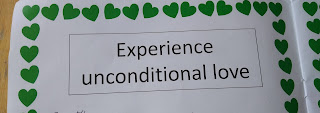What we Gain from Losing our Safety Net
Stay safe. I found it strange at first when this became our new sign-off. Shouldn’t it be 'keep well'? Or 'stay healthy'? But no, it's our safety that appears to be under threat. An intruder has broken in, past the defences we naively thought might have protected us. Over the last couple of weeks, I have started to reflect on how losing our safety net might help us better understand those who've never had one.
After my wife and I were burgled a few years ago, the thing we lost that hurt the most was not any of the possessions that were taken, but the underlying feeling that our front door marked the point at which outsiders could not enter. It has since taken time (and some heavy duty locks) to rebuild this psychological sense of security, for that is what we needed to do. We as humans need to kid ourselves every day into thinking that the walls around us will keep out any potential dangers, just so that we can go on living. Just like we need to kid ourselves into thinking that the skin around our bodies will do the same. When this illusion breaks down, our ability to get on with things in life is drastically compromised.
Not everyone is able to construct this psychological safety net for themselves. Many children with whom I work, who have suffered through early childhood trauma, have never been able to develop this fundamental sense of security. Theirs has been a lifetime of donning their metaphorical face masks, of keeping 2m away from strangers. And while we know that our own foray into the realm of heightened public anxiety is a temporary trip, that we will one day be able to install those heavy duty locks and re-construct our protective cages, for some this will never be an option.
So it is a worthwhile exercise to examine how we behave in these conditions, and through this lens reflect on the behaviours we witness in trauma impacted young people. I’ve laid to rest, for instance, many of the more ambitious goals I had at the start of the year. As businesses around the world turn their attention from growth to survival, so do we as individuals. Plans for career progression, finding fulfilment, saving the world, all are shelved for the time being. How can we think of these loftier, future-oriented goals when our minds are consumed by the challenges of today? When we are frenetically calculating how we are going to get dinner on the table, or how best to stop our loved ones from falling sick? I have written previously about how I believe Maslow's hierarchy of needs deserves to be more widely recognised as a vital framework for supporting young people. Well I feel as if we have all slipped down a few steps of his pyramid in recent weeks. Esteem and self-actualisation can wait, while we slowly shore up our need to 'stay safe'.
Practically, what this means for teachers such as myself and those I've spoken to, is that we are not going to spend this time trying to push our students through the curriculum for 6 hours a day (even if we could). Progress measures can wait. For me, overseeing the small number of children who are either vulnerable or the offspring of key workers, it feels enough to know that they are safe. Many others won't be. Many won't be getting nearly enough sleep, fresh air, exercise. Many won't be adequately fed. It is to these more fundamental needs that we now turn our attention. Under normal circumstances we wouldn’t give them a moment’s thought. Indeed it is only through this forgetting that we are able to concentrate instead on teaching them higher order skills; skills that could in theory help them reach for potential self-actualisation, rather than the basic nutrition needed to meet their physiological needs.
Consider how our shopping habits have changed. One analysis found that the empty shelves couldn't be attributed to the very small number of people who were actually 'stockpiling', but rather the result of the majority of shoppers buying one extra bag of pasta, one more tin of beans a week. We secretly like to watch videos of monstrous hoarders piling their trolleys with mountains of loo-roll, or filling their garages with hand-sanitiser, because it allows us to see these people as 'other'. But the truth is we are all just buying slightly more, and supermarket supply chains are simply not set up to deal with such widespread behaviour change. It's not selfishness, these are just the behaviours of self-preservation. Food banks are fully stocked not by a surplus of produce, but by the generosity that comes when large numbers of people feel like they have enough. Now, donations are down to 25% of their normal volume, and one of the food banks in the borough where I work has already been forced to close down due to shortages. It’s not that people no longer care, it’s just that they now have too much else to care about.
And so it is with trauma-impacted young people. They are not selfish. They are not short-sighted. They are not unambitious. But they might be more inclined to act out of self-preservation simply because these are the skills they have most needed to acquire. If it seems like they don't care about their futures, they might simply be too consumed by the daily challenges of their present. We know that their fight / flight / freeze response, evolved over millennia to protect ourselves from external threats, is already over-sensitised by events that have made it too hard for them to accurately gauge the threat posed by those around them. And of course we’ll never know what this is really like for them, but it seems like a good opportunity right now to think about how this might feel. To walk down to your nearest shop feeling like everyone around you is a potential threat, every public surface something to be avoided, a nagging fear that the shelves will be empty anyway.
Now imagine how you would react if someone then placed greater demands on your mental energies. Imagine, on this walk that is suddenly fraught with danger, being asked to answer clues from a cryptic crossword, or to describe the key differences between igneous and sedimentary rocks. Try and complete these mental tasks at the same time as working out if that passerby is getting too close, or how many people have touched that shopping basket since it was last cleaned, or whether it's worth risking another trip tomorrow on the off chance there might be some fresh fruit on the shelves.
 |
| To Travel There by Evie Kitt |
It's a form of what's called 'moral fatigue'. "Routine activities now require critical thinking," psychiatrist Dr Dion Metzger has said about the current crisis. "It's leaving my patients feeling not only exhausted, but on edge." The fatigue borne out of this pandemic exists in a very different space to that which stems from a brain affected by childhood trauma, and I don't want to suggest they are the same. I'm just finding there is at least a commonality in the resulting symptoms and behaviours, that could make this a useful time for all of us to reflect. That 'on edge' child being pushed through the national curriculum, might he be emotionally exhausted from the stresses of having to make multiple decisions that should be mundane but aren't? Might we now understand a little bit better what that might feel like?
So please do stay safe everybody. But once this has all blown over, and it will, let's remember what it felt like when we weren't.





Comments
Post a Comment